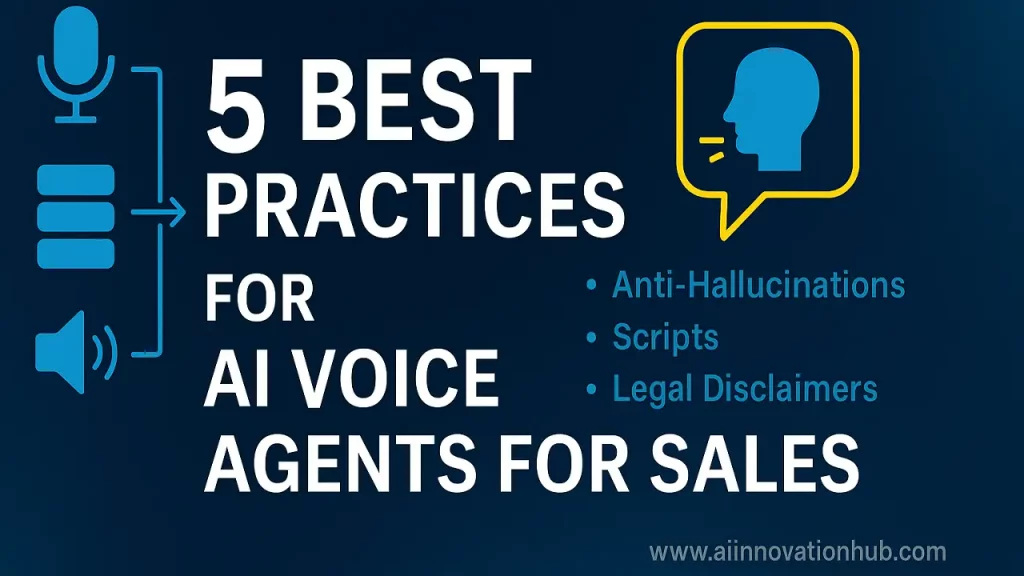5 Best Practices for AI Voice Agents for Sales (2025)
In the fast-paced world of sales, every second counts, and the integration of AI voice agents for sales is transforming the way businesses engage with potential customers. These voice AI technologies have evolved far beyond basic IVR systems, now offering sophisticated conversational capabilities that enhance efficiency and customer satisfaction. With speech recognition software and 24/7 availability, AI voice agents can handle routine tasks and provide seamless 24/7 customer support, allowing sales teams to focus on high-value interactions. As AI sales automation continues to advance, it’s crucial to understand the best practices for deploying these powerful tools. Subscribe to the website to stay ahead of the curve and discover how to leverage AI voice agents effectively in your sales strategy.

Introduction: AI voice agents for sales — why they matter in 2025
As we step into 2025, the significance of AI voice agents for sales is more pronounced than ever, offering unparalleled efficiency and personalization. These advanced tools are revolutionizing the way businesses interact with their customers, transforming mundane and repetitive tasks into automated, yet highly engaging, conversations. By integrating voice AI into their sales processes, companies can significantly reduce the time and resources spent on initial customer interactions, allowing sales teams to focus on high-value, strategic activities.
The evolution of voice AI technology has been remarkable. From the early days of Interactive Voice Response (IVR) systems, which were limited to basic menu-driven interactions, to today’s sophisticated conversational agents, the capabilities have expanded exponentially. Modern AI voice agents can understand natural language, provide contextually relevant responses, and even exhibit a degree of emotional intelligence. This evolution has made them indispensable in the sales landscape, where the ability to connect with customers on a personal level is crucial.
One of the most significant benefits of AI voice agents for sales is their ability to handle routine tasks efficiently. These agents can manage initial inquiries, provide product information, and even guide customers through the early stages of the sales funnel. By automating these tasks, sales teams can concentrate on building deeper relationships and closing deals, ultimately driving higher revenue and customer satisfaction. Moreover, the 24/7 availability of AI voice agents for customer support ensures that customers receive assistance whenever they need it, enhancing service quality and availability.
However, as with any powerful technology, the deployment of AI voice agents in sales must be approached with caution. Legal compliance for AI bots is a critical aspect that businesses cannot afford to overlook. Ensuring that these agents adhere to data privacy laws, regulatory requirements, and ethical standards is essential for maintaining customer trust and avoiding legal pitfalls. As we delve deeper into the capabilities and applications of AI voice agents, it’s important to keep these considerations in mind.
If you care that your letters, business proposals and returns look legitimate rather than “some bot” spam, read our review on digital signature of content and copyright protection. We show you how to tag materials and prove that it was you, not the fake AI clone: https://aiinovationhub.com/c2pa-content-credentials/
-It’s good for sales, for lawyers, and for brand reputation.

Stack overview (ASR → LLM → TTS): Speech recognition in call conversion
The stack that powers AI voice agents, from Automatic Speech Recognition (ASR) to Large Language Models (LLMs) and Text-to-Speech (TTS), forms the backbone of modern call conversion strategies. At the heart of this stack is ASR technology, which plays a crucial role in transforming spoken words into text. This initial step is essential because it allows the AI to accurately capture and transcribe what the customer is saying, ensuring that no valuable information is lost.
The accuracy of speech recognition software has significantly improved over the years, making it capable of functioning effectively even in noisy environments. This enhancement is particularly important for sales teams, as it boosts lead capture by ensuring that every customer interaction is accurately recorded and analyzed.
Once the spoken words are transcribed, the next component in the stack, LLMs, comes into play. These advanced models are designed to interpret the transcribed text and generate human-like responses. The ability of LLMs to understand context, nuances, and customer intent is what sets them apart from traditional automated systems. By leveraging LLMs, AI voice agents can engage in more meaningful and personalized conversations, which are crucial for converting leads into customers. The real-time analytics provided by ASR technology enable the AI to offer instant feedback, allowing sales teams to adjust their strategies on the fly. This dynamic interaction not only enhances the customer experience but also increases the likelihood of a successful sale.
Finally, the stack is completed with TTS technology, which converts the AI-generated text back into speech. The quality of TTS technology has advanced to the point where the AI’s voice sounds natural and engaging, making it easier for customers to trust and interact with the AI. The combination of accurate transcription, intelligent interpretation, and natural delivery creates a seamless and effective sales process. As businesses continue to integrate these technologies, the potential for AI-driven call conversion is becoming increasingly significant, offering a powerful tool for sales teams to enhance their performance and close more deals.
If you are building agent processes around the sale of equipment (either reselling or white-label delivery), you will need a normal source of iron. We show separately Chinese laptops and mini PCs, which are actually sold in Europe without the added drama of price: https://laptopchina.tech/
- come and see what it is now profitable to ship to the customer as a “ready-made solution” instead of forever ordering an expensive brand and cutting your brand.

Technology basics: What Voice AI Is and How It Evolved Beyond IVR
Voice AI has come a long way since the days of Interactive Voice Response (IVR), evolving into a sophisticated tool that understands and interacts with customers in real-time. Traditional IVR systems were limited to pre-programmed responses and rigid call flows, often leading to frustrating customer experiences. However, with the advent of advanced speech recognition software, Voice AI can now transcribe and interpret human speech with remarkable accuracy. This technology, known as Automatic Speech Recognition (ASR), forms the foundation of modern Voice AI systems, enabling them to understand customer inquiries and respond appropriately.
The integration of Large Language Models (LLMs) and Text-to-Speech (TTS) technologies has further revolutionized the way AI call agents operate. LLMs, which are trained on vast amounts of data, can generate human-like responses and provide contextually relevant information. This capability is crucial for sales conversations, where the ability to adapt to customer tone and intent can significantly enhance engagement and conversion rates. TTS, on the other hand, converts text into spoken words, ensuring that the AI’s responses are delivered in a natural and engaging manner. Together, these technologies create a seamless and personalized interaction that feels almost indistinguishable from a human conversation.
Real-time data analysis is another key aspect of Voice AI that sets it apart from its predecessors. During a call, AI voice agents for sales can analyze customer data and behavior to provide tailored product recommendations. This not only improves the customer experience but also increases the likelihood of closing a sale. For example, an AI call agent might recognize that a customer has been browsing a particular product category and use this information to suggest complementary items or special offers. The ability to process and act on real-time data in this way is a game-changer for businesses looking to optimize their sales processes.
Ethical guidelines are essential in ensuring that these interactions are both compliant and trustworthy. As Voice AI continues to evolve, it is crucial for companies to implement robust ethical frameworks to protect customer data and ensure that AI interactions are transparent and fair. This includes adhering to legal standards and maintaining high levels of data security. By doing so, businesses can build a strong foundation of trust with their customers, which is vital for long-term success.
AI voice agents for customer support have also seen significant advancements, leveraging the same technologies to provide more personalized and efficient support. These agents can handle a wide range of customer inquiries, from simple FAQs to more complex issues, all while maintaining a friendly and helpful tone. The combination of ASR, LLM, and TTS ensures that customer support interactions are not only resolved quickly but also leave the customer feeling valued and understood.

Sales playbooks: AI sales automation as a force multiplier for your team
AI sales automation is more than just a tech buzzword; it’s a powerful force multiplier that can enhance your sales team’s productivity and close more deals. One of the most significant advantages of AI voice agents for sales is their ability to streamline follow-ups, ensuring that no leads are left behind. Traditional sales processes often suffer from the human limitations of time and attention, leading to missed opportunities. AI voice agents can automatically schedule and execute follow-up calls, sending reminders to sales reps and even making the calls themselves when appropriate. This not only keeps the pipeline moving but also provides a consistent touchpoint for potential customers, building trust and engagement.
Automated dialing and scheduling are just the tip of the iceberg. Voice AI can also analyze customer interactions in real-time, providing valuable insights that help sales reps tailor their responses. By understanding the tone and sentiment of a customer’s voice, these agents can suggest the best next steps, whether it’s a more aggressive pitch or a softer, relationship-building approach. This real-time analysis is particularly useful in high-stakes sales scenarios where the right response can make or break a deal. Moreover,
AI call agents can integrate seamlessly with your sales playbooks, guiding them through nuanced scenarios and ensuring that they follow best practices. This integration means that even less experienced reps can perform at a higher level, leveraging the collective wisdom of your team’s most successful strategies.
LLM-driven insights take this a step further by predicting buyer behavior. These insights can help identify which leads are most likely to convert, allowing your team to focus their efforts on the most promising opportunities. Additionally, AI can suggest upsell and cross-sell opportunities based on customer interactions, increasing the average deal size and overall revenue. By combining these advanced capabilities with traditional sales techniques, your team can achieve a level of efficiency and effectiveness that would be impossible without the assistance of AI sales automation.

Personalizing customer interactions with AI voice agents
Personalizing customer interactions with AI voice agents for sales is not just a nice-to-have; it’s a necessity in today’s competitive market. Customers expect a tailored experience that reflects their unique needs and preferences. Voice AI has evolved to meet these expectations by seamlessly integrating advanced personalization features that enhance engagement and build trust. One of the most significant advancements is the ability of AI voice agents to adapt to the customer’s tone and mood during a conversation. This adaptability ensures that the interaction feels natural and responsive, which is crucial for maintaining a positive customer experience.
Customizable greetings are another key feature that can make a significant difference in how customers perceive their interactions. When a caller is greeted with a personalized message that acknowledges their previous interactions or purchase history, it creates a seamless and welcoming experience. This level of personalization is not only about making the customer feel valued but also about setting the stage for a more effective sales conversation. By leveraging the data available from past interactions, AI voice agents can address customers by name, reference their recent activities, and even anticipate their needs. This not only streamlines the conversation but also builds a stronger connection with the customer, making them more likely to engage in a meaningful dialogue.
Dynamic scripting is a powerful tool that allows AI voice agents to offer personalized product recommendations based on real-time data and customer feedback. Instead of following a rigid script, these agents can adjust their responses to better fit the customer’s interests and needs. For example, if a customer has previously shown interest in a particular product line, the AI can highlight those products and provide relevant information. This flexibility not only increases the likelihood of a successful sale but also ensures that the customer feels heard and understood. By providing tailored recommendations, AI voice agents can guide customers through the decision-making process, offering valuable insights and support that might otherwise be missed in a generic interaction.
Privacy settings and data security are non-negotiable aspects of personalization. While the ability to customize interactions and offer dynamic recommendations is valuable, it must be balanced with robust privacy measures to protect customer information. Legal compliance for AI bots is a critical consideration, ensuring that all data handling practices meet regulatory standards. AI voice agents are designed with privacy in mind, using encrypted data storage and secure communication channels to safeguard sensitive information. This commitment to privacy not only complies with legal requirements but also reassures customers that their data is in safe hands, further enhancing their trust in the brand.

Scripts & prompts: designing voice bots for cold and warm leads
Crafting effective scripts and prompts for AI voice agents for sales requires a blend of art and science, tailored to both cold and warm leads. For cold leads, the initial interaction is crucial. The script must be designed to capture attention immediately, engage the prospect, and qualify their interest efficiently. Start with a compelling greeting that personalizes the interaction, perhaps by using the lead’s name or referencing a recent event or interest. The script should then guide the conversation with open-ended questions to gather more information and determine the lead’s needs and pain points. This approach helps in qualifying the lead and deciding whether to pass them to a human sales representative or continue the automated engagement.
For warm leads, the focus shifts to nurturing the existing relationship and guiding the conversation towards a sale. Dynamic prompts are essential here, as they allow the voice bot to adapt to the lead’s responses and maintain a personalized touch. Utilize natural language processing (NLP) to analyze the lead’s previous interactions and tailor the prompts accordingly. For example, if a lead has shown interest in a specific product feature, the bot can emphasize that feature in the conversation. This not only makes the interaction more relevant but also builds trust and rapport, increasing the likelihood of a successful conversion.
Incorporating speech recognition software is crucial for improving the accuracy and enhancing the customer experience. Advanced speech recognition technologies can understand a wide range of accents and dialects, ensuring that the bot accurately captures the lead’s responses. This accuracy is vital for maintaining the flow of the conversation and providing relevant, timely information. Moreover, speech recognition software can help in identifying key phrases and sentiments, allowing the bot to respond appropriately and keep the conversation on track.
Ensuring legal compliance for AI bots is another critical aspect of designing effective scripts and prompts. Transparent communication is key to building trust with customers. Make sure the bot clearly identifies itself as an AI and does not misrepresent its capabilities. Additionally, comply with data privacy regulations by obtaining explicit consent before collecting and using any customer data. This not only protects your business from legal risks but also reassures customers that their information is handled responsibly and securely.

Anti-hallucinations: practical LLM hallucination prevention for safe answers
Ensuring that AI voice agents provide safe and accurate responses involves practical measures to prevent large language model hallucinations. Hallucinations, or instances where the AI generates information that is incorrect or entirely fabricated, can erode customer trust and lead to serious business repercussions. By implementing robust strategies, companies can enhance the reliability of their AI voice agents and maintain a positive customer experience.
One effective method is to establish feedback loops that continuously refine AI responses. These loops allow businesses to collect data on customer interactions, identify inaccuracies, and update the AI’s training data accordingly. For example, if a customer reports that an AI agent provided incorrect product information, the feedback can be used to correct the AI’s understanding and prevent similar errors in the future. This iterative process not only reduces the likelihood of hallucinations but also improves the overall performance of the AI voice agents for sales and customer support.
Another crucial step is to use knowledge graphs, which provide the AI with a structured, verified database of information. Knowledge graphs ensure that the AI can draw from accurate and reliable sources, reducing the risk of generating false or misleading responses. For instance, a knowledge graph can be populated with verified product details, company policies, and frequently asked questions, allowing the AI to provide precise and contextually appropriate answers. This approach is particularly beneficial in sales scenarios where the accuracy of information can significantly impact customer decisions.
Leveraging human oversight is also essential, especially for handling complex queries. While AI is highly capable, there are situations where human intervention is necessary to ensure the accuracy and appropriateness of responses. By integrating a system where human agents can review and validate AI-generated answers, businesses can maintain a high level of trust and reliability. This hybrid approach combines the efficiency of AI with the nuanced understanding and judgment of human experts, creating a more robust and effective customer interaction process.
Integrating compliance checks is another critical measure to avoid legal issues and ensure ethical interactions. These checks can be automated to verify that the AI’s responses adhere to relevant laws, regulations, and company policies. For example, in the financial sector, AI voice agents must be carefully monitored to ensure they do not provide advice that could be considered unauthorized or misleading. By incorporating compliance checks, businesses can safeguard against potential legal pitfalls and maintain a high standard of ethical conduct.
Finally, testing AI with edge cases is essential to identify and fix potential hallucination triggers. Edge cases are unusual or extreme scenarios that the AI might not have encountered during its initial training. By exposing the AI to a wide range of such cases, companies can better understand its limitations and take steps to mitigate them. This proactive approach helps ensure that the AI remains reliable and accurate, even in unexpected situations.

Training AI call agents for emotional intelligence
Training AI call agents for emotional intelligence is crucial in building trust and creating meaningful connections with customers. In sales, the ability to detect and respond to a customer’s emotional state can make the difference between a successful conversion and a lost opportunity. For instance, when a customer is frustrated, an AI call agent must be able to recognize the signs—such as a raised voice, repeated questions, or specific phrases—and adjust its tone and offers accordingly. This de-escalation can transform a negative interaction into a positive one, fostering customer loyalty and satisfaction.
To achieve this, voice bots undergo extensive training to recognize and respond to a wide range of emotions. Joy, interest, and skepticism are just a few of the emotional states that AI must be adept at identifying and addressing. For example, when a customer expresses joy, the AI can reinforce positive feelings by offering additional information or special promotions. Conversely, when a customer shows interest, the AI can provide more detailed explanations or personalized recommendations. In cases of skepticism, the AI can offer reassurances, address concerns, and provide evidence to build trust. These nuanced responses are made possible through advanced algorithms and machine learning models that are continuously refined to enhance their emotional detection capabilities.
One of the most powerful tools in this training arsenal is real-time sentiment analysis. By analyzing the customer’s voice and speech patterns in real-time, AI call agents can quickly gauge the emotional state of the caller and adapt their responses accordingly. This technology not only helps in de-escalating negative emotions but also in amplifying positive ones, ensuring that each interaction is as supportive and personalized as possible. Feedback loops play a critical role in this process, allowing the AI to learn from each interaction and improve its empathy over time. This continuous learning ensures that the AI can build rapport with each caller, making the conversation feel more natural and human-like.
Ethical guidelines are also essential in the training of AI call agents. These guidelines ensure that AI interactions are respectful, transparent, and enhance customer trust. For example, AI should never pretend to be a human without disclosing its true nature, and it should always prioritize the customer’s well-being and privacy. By adhering to these principles, companies can ensure that their AI call agents not only perform effectively but also maintain a high standard of ethical conduct. This commitment to ethics is vital in an era where customers are increasingly aware of and concerned about the use of AI in their interactions.

Ensuring ethical use of AI in sales conversations
Ethical use of AI in sales conversations is not just a regulatory concern; it’s a cornerstone of building long-term customer relationships. One of the most critical aspects of this ethical framework is transparency. AI voice agents for sales must clearly inform customers that they are interacting with a bot, not a human. This transparency is essential for maintaining trust and ensuring that customers feel comfortable and respected throughout the conversation. Customers should never be left in doubt about who they are speaking with, as this can lead to confusion and dissatisfaction, ultimately damaging the brand’s reputation.
Sales scripts designed for AI call agents should be crafted with meticulous care to avoid misleading claims. The focus should always be on providing accurate and helpful information. This means that the scripts should not exaggerate the capabilities of the products or services being offered. Instead, they should highlight genuine benefits and address customer needs and concerns in a straightforward and honest manner. By doing so, AI call agents can foster a sense of reliability and integrity, which are crucial for converting leads into loyal customers.
Regular audits are another vital component of ensuring ethical use. These audits help to verify that AI voice agents for sales are in compliance with legal standards and regulations. By maintaining strict legal compliance for AI bots, businesses can protect both their own interests and the rights of their customers. This proactive approach not only mitigates the risk of legal issues but also demonstrates a commitment to ethical business practices. Audits should be comprehensive, covering all aspects of the AI’s interactions, from the initial greeting to the final sale, to ensure that every step is above board.
Minimizing bias is equally important in the ethical use of AI. AI call agents must be trained to treat all customer demographics fairly and equally. This involves using diverse training data and regularly monitoring the AI’s performance to identify and correct any biases that may emerge. Bias can manifest in subtle ways, such as through language choices or the types of offers presented to different customers. By actively working to eliminate bias, businesses can ensure that their AI interactions are inclusive and equitable, enhancing the overall customer experience.
Implementing feedback loops is a key strategy for continuously improving the performance of AI call agents. Customer feedback provides valuable insights into the strengths and weaknesses of the AI, allowing businesses to make data-driven adjustments. These feedback loops should be designed to address customer concerns promptly and effectively. By listening to and acting on customer feedback, businesses can refine their AI interactions to better meet customer needs and expectations. This ongoing process of improvement not only enhances the effectiveness of the AI but also reinforces the company’s commitment to ethical practices.

Conclusion & ROI: AI Voice Agents for Sales — Success Metrics, Risks, Roadmap
As we wrap up, let’s explore the success metrics, potential risks, and a roadmap for implementing AI voice agents in your sales strategy. The integration of AI voice agents for sales has the potential to revolutionize how businesses connect with their customers. These advanced tools can significantly enhance sales efficiency by reducing manual call times and increasing conversion rates. One of the most compelling success metrics is the speed at which leads are qualified. With AI handling initial calls, sales teams can focus on high-potential leads, leading to faster and more effective lead nurturing. Additionally, customer engagement levels tend to rise as AI voice agents provide personalized and timely interactions, keeping prospects interested and informed.
However, it’s crucial to address the risks associated with this technology. Data privacy concerns are paramount, and businesses must ensure that all customer data is handled securely and in compliance with relevant regulations. Another significant risk is the potential for LLM hallucination. Advanced training and continuous monitoring are essential to prevent AI from generating inaccurate or misleading information, which can damage customer trust and brand integrity. Ethical use of AI in sales conversations is non-negotiable, and ensuring legal compliance for AI bots is a critical step in maintaining customer trust and adhering to industry standards.
Looking ahead, the future roadmap for AI voice agents is promising. As technology continues to evolve, we can expect to see more sophisticated and personalized interactions. Advanced AI will not only handle routine tasks but also demonstrate a higher level of emotional intelligence, making conversations more empathetic and human-like. This evolution will enable AI voice agents for sales to build stronger relationships with customers, ultimately driving overall sales growth. By staying at the forefront of these developments, businesses can harness the full potential of AI to enhance their sales strategies and deliver exceptional customer experiences.
Incorporating AI voice agents into your sales process is a strategic move that can yield substantial returns. By focusing on key success metrics, mitigating risks, and following a clear roadmap, you can ensure that your AI implementation is both effective and ethical. The future of sales is here, and it’s powered by AI. Embrace the change, and watch your business thrive.
Related
Discover more from AI Innovation Hub
Subscribe to get the latest posts sent to your email.